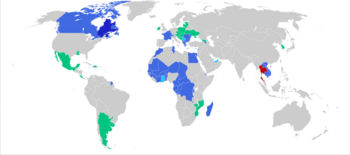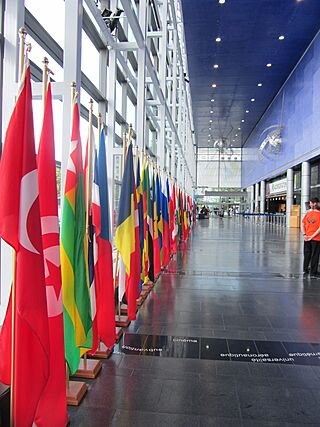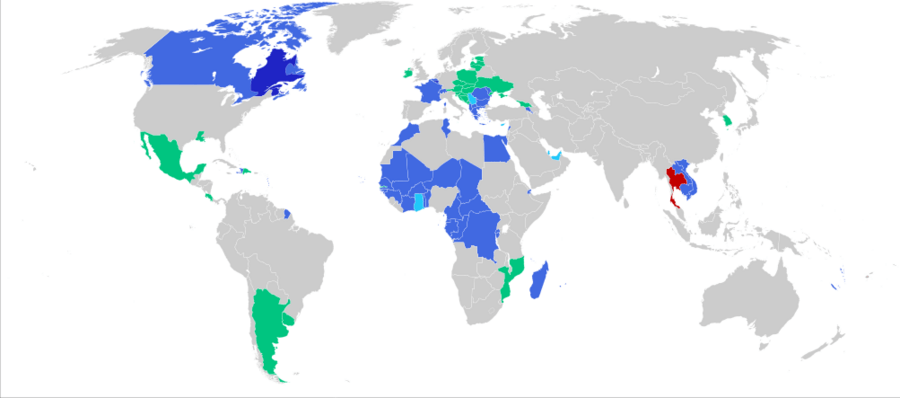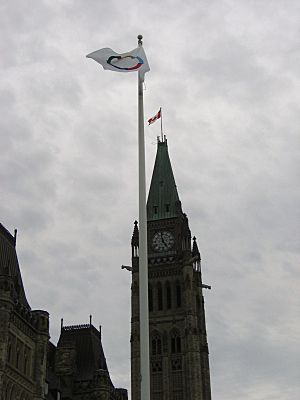- This page was last modified on 26 December 2025, at 06:48. Suggest an edit.
Organisation internationale de la Francophonie facts for kids
"Francosphere" redirects here. For the French-speaking world, see Francophonie.
|
Organisation internationale
de la Francophonie |
|
|---|---|

National members
Regional members Associated members Former members Observers |
|
| Headquarters | Paris, France |
| Official language | French |
| Membership |
56 full members
∟ ∟ ∟ |
| Leaders | |
|
• Secretary-General
|
Louise Mushikiwabo |
|
• APF General Secretary
|
Jacques Krabal |
|
• APF President
|
François Paradis |
| Establishment | |
|
• Conference of Niamey
|
20 March 1970 (as ACCT) |
|
• Conference of Hanoi
|
14–16 November 1997 (as La Francophonie) |
| Area | |
|
• Total
|
28,223,185 km2 (10,897,033 sq mi) |
| Population | |
|
• 2016 estimate
|
1 billion |
|
• Density
|
36/km2 (93.2/sq mi) |
| GDP (nominal) | 2023 estimate |
|
• Total
|
|
|
|
The Organisation internationale de la Francophonie (OIF), often called La Francophonie, is an international group of countries. These countries share a connection to the French language and culture.
The OIF has 93 members, including 56 full members, 5 associate members, and 32 observers. The word francophonie (with a small "f") also means the worldwide community of people who speak French. This community includes many groups that work to connect countries where French has been important historically, culturally, or politically.
The OIF started in 1970. Many of its first members and current full members were once part of the French colonial empire. Its main office is in Paris, France. The OIF's motto is "equality, complementarity, solidarity." This motto is similar to France's own motto, "liberty, equality, fraternity."
From a small group of French-speaking countries, the OIF has grown into a global organization. Its different parts work with member countries on culture, science, economy, justice, and peace. The OIF's main goals are to promote the French language and different cultures, support peace, democracy, and human rights, and help with education, research, and development. The OIF is also an observer at the United Nations (UN).
Contents
How La Francophonie Started
The agreement that created the Agency for Cultural and Technical Co-operation (ACCT) was signed in Niamey, Niger, on March 20, 1970. Representatives from 21 countries and governments signed it. Important African leaders like Léopold Sédar Senghor of Senegal and Habib Bourguiba of Tunisia helped make this happen.
The main goals of this new organization were to promote the cultures of its members and to increase cultural and technical cooperation. It also aimed to build friendship and connections among members through discussions.
The Francophonie project kept growing. In 1997, the ACCT became the Intergovernmental Agency of the Francophonie. Then, in 2005, a new Charter of the Francophonie was adopted, giving the organization its current name: International Organisation of the Francophonie.
How La Francophonie Works
Leaders of La Francophonie
The position of Secretary-General was created in 1997. The Secretary-General is elected during the Summit and is the main spokesperson for the OIF's political actions around the world. They suggest important areas for the OIF to work on. Their job is to help cooperation among French-speaking countries and make sure all programs work well together. The Secretary-General serves a four-year term.
Here are the people who have served as Secretary-General:
| No. | Image | Name | Country | Start | End |
|---|---|---|---|---|---|
| 1 |  |
Boutros Boutros-Ghali | November 16, 1997 | December 31, 2002 | |
| 2 |  |
Abdou Diouf | January 1, 2003 | December 31, 2014 | |
| 3 |  |
Michaëlle Jean | January 5, 2015 | January 2, 2019 | |
| 4 |  |
Louise Mushikiwabo | January 3, 2019 | incumbent |
Big Meetings (Summits)
The Summit is the highest authority in the OIF. It happens every two years and brings together the leaders of all member countries. They discuss important topics. The leader of the host country chairs the Summit until the next one. These Summits help create plans and goals for the OIF to have an impact on the world.
Here are some of the past Summits:
| No. | Country/Region | City | Dates | Host |
|---|---|---|---|---|
| I | Versailles | February 17–19, 1986 | President François Mitterrand | |
| This first meeting aimed to start regular discussions on important global issues. It highlighted French as a modern language for progress and cultural exchange. | ||||
| II | Quebec City | September 2–4, 1987 | Prime Minister Brian Mulroney | |
| This Summit set up areas for cooperation, like agriculture, energy, science, and culture. | ||||
| III | Dakar | May 24–26, 1989 | President Abdou Diouf | |
| Leaders agreed on plans for education, the environment, and legal cooperation. France also canceled the debt of 35 African countries. | ||||
| IV | Paris | November 19–21, 1991 | President François Mitterrand | |
| Nearly 50 countries attended. The Ministerial Conference and Permanent Council of La Francophonie were created. | ||||
| V | Port Louis | October 16–18, 1993 | President Veerasamy Ringadoo | |
| Leaders stressed the importance of economic issues and called for more cooperation among French-speaking businesses. | ||||
| VI | Cotonou | December 2–4, 1995 | President Nicéphore Soglo | |
| This Summit created the Secretary-General position and changed the ACCT into the Intergovernmental Agency of La Francophonie. | ||||
| VII | Hanoi | November 14–16, 1997 | President Trần Đức Lương | |
| A new Charter was put in place, and Boutros Boutros-Ghali became the first Secretary-General. The main topic was economic cooperation. | ||||
| VIII | Moncton | September 3–5, 1999 | Prime Minister Jean Chrétien | |
| The main theme was youth, along with the economy and new technologies. | ||||
| IX | Beirut | October 18–20, 2002 | President Émile Lahoud | |
| The theme was "Dialogue of Cultures." Leaders promised to follow the Bamako Declaration on democracy and human rights. Abdou Diouf was elected Secretary-General. | ||||
| X | Ouagadougou | November 26–27, 2004 | President Blaise Compaoré | |
| The theme was "La Francophonie: A Space of Solidarity for Sustainable Development." A ten-year plan was adopted, focusing on promoting French, peace, education, and sustainable development. | ||||
| XI | Bucharest | September 28–29, 2006 | President Traian Băsescu | |
| The theme was "Information Technologies in Education." Abdou Diouf was re-elected. | ||||
| XII | Quebec City | October 17–19, 2008 | Prime Minister Stephen Harper | |
| This Summit was part of Quebec City's 400th anniversary. World financial and food crises were discussed. | ||||
| XIII | Montreux | October 22–24, 2010 | President Doris Leuthard | |
| Discussions included climate change, food, and economic problems. The Montreux Declaration called for the OIF to play a role in global issues and support sustainable development. Abdou Diouf was re-elected for a third term. | ||||
| XIV | Kinshasa | October 12–14, 2012 | President Joseph Kabila | |
| The theme was "La Francophonie, Economic and Environment Issues in the face of Global Governance." | ||||
| XV | Dakar | November 29–30, 2014 | President Macky Sall | |
| The theme was "Women and Youth in La Francophonie: Agents for Peace and Development." Michaëlle Jean was elected Secretary-General. | ||||
| XVI | Antananarivo | November 26–27, 2016 | Prime Minister Olivier Solonandrasana | |
| The theme was "Shared Growth and Responsible Development." Discussions included peace, gender equality, and preventing extremism. | ||||
| XVII | Yerevan | October 11–12, 2018 | Prime Minister Nikol Pashinyan | |
| Louise Mushikiwabo was elected Secretary-General. Ghana became a full member, and Louisiana (USA) became an observer. | ||||
| XVIII | Djerba | November 19—20, 2022 | Prime Minister Najla Bouden | |
| This Summit focused on making the OIF a "space for solidarity" by 2030. Louise Mushikiwabo was re-elected. | ||||
| XIX | Villers-Cotterêts and Paris | October 4—5, 2024 | President Emmanuel Macron | |
| The theme was "creating, innovating and undertaking in French." Leaders discussed promoting French, geopolitical challenges, and economic ties. They called for a ceasefire in the Israel–Hezbollah conflict. | ||||
| XX | TBA | 2026 | King of Cambodia | |
Ministerial Conference
The Ministerial Conference brings together the foreign ministers or ministers in charge of Francophone affairs from member countries every year. They make sure that decisions made at the Summits are carried out and plan for the next Summit. They also suggest new members and observers.
Permanent Council
The Permanent Council includes the ambassadors of the member countries. It is led by the Secretary-General and works under the Ministerial Conference. Its main job is to plan the Summits and oversee the daily execution of Summit decisions.
Parliamentary Assembly
The Parliamentary Assembly of the Francophonie (APF) represents the interests of French-speaking communities. It promotes democracy, the rule of law, and human rights. It also encourages cooperation and friendship among French-speaking communities, especially among parliaments in the Global South.
Agency of the Francophonie
The Agency of the Francophonie is the main group that carries out the cultural, scientific, technical, economic, and legal cooperation programs decided at the Summits. It also helps develop the French language and promotes the different languages and cultures of its members. The Agency's main office is in Paris, with regional offices in Gabon, Togo, and Vietnam.
Who are the Members?
Sometimes, a country's membership can be suspended if there are problems with democracy, like a military takeover. For example, Mauritania's membership was suspended in 2008, and Madagascar's in 2009. Mali, the Central African Republic, and Guinea-Bissau were also suspended in 2012 for similar reasons. Thailand, an observer, was suspended in 2014.
In 2018, Louisiana became the first US state to join as an observer. In 2021, Nova Scotia in Canada announced it wanted to become an observer. In 2023, there was a military takeover in Gabon, which the OIF spoke out against, but Gabon was not suspended.
In September 2024, the OIF lifted its suspension on Guinea, which had been in place since 2021. However, in March 2025, Niger announced it was leaving the organization. Burkina Faso and Mali also left, saying the OIF applied rules unfairly and disrespected their independence.
Even though French is popular in Algeria and it was once part of France, Algeria is not currently a member of the OIF.
Groups that Help the OIF
The OIF works with five main groups to achieve its goals:
- Agence Universitaire de la Francophonie (AUF)
- TV5Monde
- Association Internationale des Maires Francophones (AIMF)
- Association des Fonctionnaires Francophones des Organisations Internationales (AFFOI)
- Université Senghor d'Alexandrie
Association of Francophone Universities (AUF)
Started in 1961, the AUF connects universities and research centers in French-speaking countries around the world. Its goal is to build a strong scientific community in French. It supports the French language, different cultures, democracy, and sustainable development. It also helps students, researchers, and professors travel and study in other countries.
TV5Monde: French-speaking International Television
TV5Monde is the first international French language TV network. It's available in many countries and is one of the largest TV networks globally. It offers French TV shows and helps spread the French language and cultures. It shows the different ways French is spoken around the world. Many viewers are not native French speakers, and the channel provides subtitles in 12 languages to help them understand.
International Association of French-speaking Mayors
This association was created in 1979 by the mayors of Quebec City and Paris. It brings together cities from 48 countries to work together on city development. Their goals are to strengthen local democracy, help cities improve, and support their communities. They work on health, culture, youth, education, city planning, and training.
Senghor University of Alexandria
The idea for a French-speaking university to help African development was adopted in 1989. Senghor University in Alexandria, Egypt, is a private university for graduate students. It trains leaders and high-level teachers in areas important for development in French-speaking Africa. This includes project management, finance, environment, health, and cultural heritage.
What La Francophonie Does
The OIF leads political actions and cooperation based on the goals set at the Summits. At these Summits, leaders discuss international politics, the world economy, cooperation among French-speaking countries, human rights, education, culture, and democracy. The OIF's actions are planned for four-year periods and are paid for by its members.
The Charte de la Francophonie (Charter of the Francophonie) explains the organization's role and missions. The current charter was adopted in Antananarivo on November 23, 2005. A plan for 2004–2014 was adopted in Ouagadougou, Burkina Faso, on November 26–27, 2004.
The four main goals of the OIF are:
- Promoting the French language and different cultures and languages.
- Promoting peace, democracy, and human rights.
- Supporting education, training, higher education, and scientific research.
- Expanding cooperation for sustainable development.
Promoting French Language and Cultural Diversity
The OIF's main goal is to promote the French language as an international language. It also works to promote cultural and language diversity in a world that is becoming more globalized. OIF members played a big part in getting UNESCO to adopt the Convention on the Protection and Promotion of the Diversity of Cultural Expressions in 2005.
In many member countries, especially in Africa, French exists alongside other languages. The OIF works to keep French important while also respecting other languages. The OIF has been a leader in recognizing cultural diversity and encouraging dialogue between cultures. It tries to fight against the trend of cultures becoming too similar because of globalization.
Promoting Peace, Democracy, and Human Rights
Like the British Commonwealth of Nations, the OIF aims to promote democracy and human rights. After the Bamako Declaration on November 3, 2000, the OIF gained the resources to achieve these goals.
The OIF wants to help promote peace, democracy, and the rule of law by focusing on preventing problems. Political stability and full rights for everyone are seen as key to long-lasting development. The OIF helps its member countries by sharing knowledge from its network of government, academic, and non-governmental groups. This helps countries build their own abilities, solve conflicts, and recover from crises.
In recent years, some member governments, like Canada and Quebec, wanted the OIF to have a rule to punish members with poor human rights records or who don't practice democracy. This idea was discussed but never approved.
Supporting Education and Research
The OIF aims to connect people who speak French through knowledge. Education, and access to information for everyone, starts with all children getting a good primary education without unfairness. This means having a complete approach to teaching and training from primary school to higher education that leads to jobs. Education policies should also make sure French has an important place alongside other languages. Finally, the OIF promotes research in French-speaking academic fields.
Cooperation for Sustainable Development
The OIF is dedicated to working towards sustainable development. This means helping to improve how economies are managed, building skills, encouraging cooperation, and finding common positions in big international discussions. It's important to manage natural resources like energy and water carefully. Policies are put in place to protect these resources and fight poverty effectively.
Support for the Organization
In 2020, Ambassador James Roscoe, a UK representative to the UN, said that the OIF has a role to play with the UN and other groups in preventing conflicts and helping countries resolve issues. He encouraged the OIF to continue supporting efforts to end violence and bring peace, for example, in Cameroon. He also noted that the OIF can help countries coming out of conflict to hold successful elections and strengthen democratic governments.
See also
 In Spanish: Organización Internacional de la Francofonía para niños
In Spanish: Organización Internacional de la Francofonía para niños
- Agence de coopération culturelle et technique
- Minister responsible for La Francophonie (Canada)
- Jeux de la Francophonie
- International Francophonie Day (Journée internationale de la Francophonie)
- Conseil international de la langue française
- French immersion
- Alliance française
- Espace Francophone pour la Recherche, le Développement et l'Innovation
- Journée internationale de la Francophonie (March 20)
- Francophone
- French colonial empire
- Geographical distribution of French speakers
- French in Africa
- French in India
- French in the United States
- Franco-Canadian relations
- French America
- Vietnamese French
- Lao French
- Cambodian French
- List of countries where French is an official language
- List of international organisations which have French as an official language
- List of French possessions and colonies
- Three Linguistic Spaces




